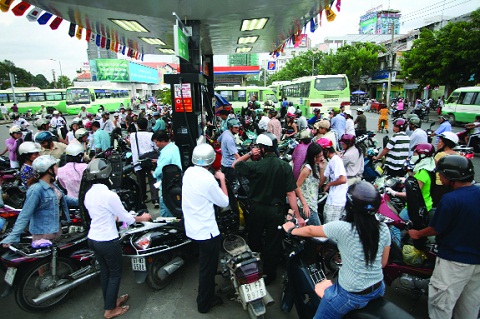Petrol price flare up
An iron hand will shape petrol price increases to protect consumers. The time between consecutive petrol price increases has been adjusted to at least 30 days to help stabilise the market, however petrol traders are unhappy.
 Petrol traders claim the move will leave them unable to respond to global market changes |
Besides, the usage of the Price Stabilisation Fund was also changed under the new document. Accordingly, enterprises will be supported by this fund at a fixed level of VND500 per litre of petrol and VND400 per litre of oil, instead VND500 per litre each previously.
However, Petrolimex deputy general director Vuong Thai Dung said: “To lengthen the time to adjust prices will definitely cause many difficulties for enterprises.”
“The global market is always subject to fluctuations. With the level of a 5-10 per cent increase in petrol prices, it will be difficult for petroleum traders to continue business and wait for 30 days to adjust their prices,” Dung said.
Meanwhile, a Military Petroleum Company representative said this change would be an obstacle for the market mechanism to function.
“Decree 84 allowed fuel suppliers to adjust petrol and oil retail prices when global prices fluctuated, but the new rule stops them from adjusting the prices for a very long time. It is contrary to the market mechanism and makes it difficult for enterprises,” the representative said.
Dung said the state had deeply intervened in enterprises’ business and management. “Decree 84 stipulated that enterprises manage the prices themselves and the state would only interfere if there were price fluctuations. However, it is necessary to consider how deep the state’s interference is in oder not to affect enterprises and market development,” Dung told VIR.
Nguyen Tien Thoa, head of the MoF’s Price Management Department, said the new regulation was one of the MoF’s efforts to curb inflation, not to increase the petrol prices in a short time which would badly impact on production and consumers’ psychology.
Local petroleum traders have not planned to adjust prices following the MoF’s document despite reporting losses. Currently, with prices at $80 per barrel of petrol and $87 per barrel of oil, petrol and oil suppliers are running at losses of several hundreds of dong per litre.
Dung said the company still had no concrete plans to increase prices. Meanwhile, Saigon Petrol general director Dang Vinh Sang said because of its small market share, Saigon Petrol would wait for Petrolimex’s move before adjusting prices.
Petrolimex is currently the biggest of 11 petroleum retailers in Vietnam, having 1,900 refilling stations nationwide and holding a 60 per cent of domestic market share, while Saigon Petrol accounts for an 8 per cent market share.
What the stars mean:
★ Poor ★ ★ Promising ★★★ Good ★★★★ Very good ★★★★★ Exceptional
Related Contents
Latest News
More News
- Cashless payments hit 28 times GDP in 2025 (February 04, 2026 | 18:09)
- SSIAM and DBJ launch Japan Vietnam Capital Fund (February 04, 2026 | 15:57)
- Banks target stronger profits, credit growth in 2026 (February 04, 2026 | 15:43)
- Vietnam on path to investment-grade rating (February 03, 2026 | 13:07)
- Consumer finance sector posts sharp profit growth (February 03, 2026 | 13:05)
- Insurance market building the next chapter of protection (February 02, 2026 | 11:16)
- NAB Innovation Centre underscores Vietnam’s appeal for tech investment (January 30, 2026 | 11:16)
- Vietnam strengthens public debt management with World Bank and IMF (January 30, 2026 | 11:00)
- Corporate bond market poised for stronger growth cycle (January 28, 2026 | 17:13)
- Vietnam's IPO market on recovery trajectory (January 28, 2026 | 17:04)

 Tag:
Tag:




















 Mobile Version
Mobile Version